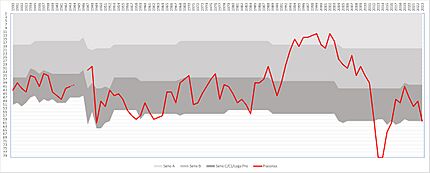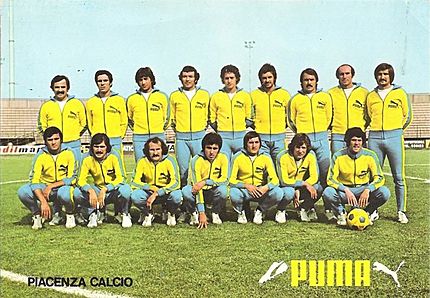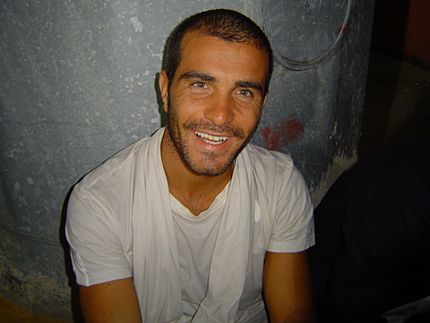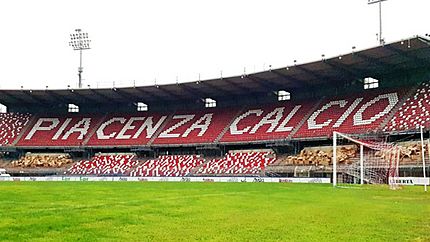Piacenza Calcio 1919 facts for kids
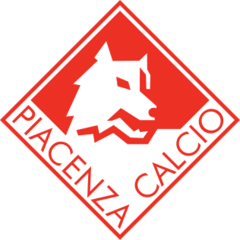 |
||||
| Full name | Piacenza Calcio S.r.l. | |||
|---|---|---|---|---|
| Nickname(s) | Il Piace (The Piace) I Biancorossi (The Red and Whites) I Papaveri (The Poppies) I Lupi (The Wolves) |
|||
| Founded | 1919 | |||
| Ground | Stadio Leonardo Garilli | |||
| Capacity | 21,668 | |||
| Owner | Roberto Pighi, Polenghi Group S.p.A., Artigiana Farnese S.r.l | |||
| Chairman | Roberto Pighi | |||
| Manager | Stefano Rossini | |||
| League | Serie C Group B | |||
| 2018–19 | Serie C Group A, 2nd of 20 | |||
|
||||
Piacenza Calcio 1919, often called Piacenza, is an Italian football club. It is based in the city of Piacenza, in the Emilia-Romagna region of Italy. The team currently plays in Serie D, which is one of Italy's football leagues.
The club you see today was started again in 2012. It took over the name and history of the original club, Piacenza Calcio, which was also known as Piacenza F.C..
Contents
Club History
Piacenza has a long and interesting history in Italian football. The club has moved between different leagues over the years, showing great determination.
How Piacenza Football Club Started
Piacenza Football Club began in 1919. Its first president was Giovanni Dosi. He was a very driven leader. Dosi managed everything about the club, from its daily running to its team strategies. His main goal was to help the club join the national championship under the FIGC.
For many years, Piacenza played in regional leagues. Then, in the 1935–36 season, they joined Serie C. They almost got promoted to Serie B in 1938 but lost to Fanfulla.
Moving Between Leagues
After World War II, Piacenza played in Serie B for the first time. They stayed there for two seasons. In 1948, they moved back down to Serie C.
In 1956, the club faced a penalty for breaking some rules. This led to them being moved down to Serie D. This was a tough time for the club. They kept moving between Serie C and Serie D until 1964. Piacenza finally returned to Serie B in 1969. This happened under coach Tino Molinari and president Vincenzo Romagnoli.
For a long time, Piacenza's history was not very famous. They had short times in Serie B in the 1940s. They also played in Serie B during the 1969–70, 1975–76, and 1987–88 to 1988–89 seasons.
Reaching Serie A
In 1991, the team's luck changed. Under coach Gigi Cagni, Piacenza was promoted to Serie A for the first time in 1993. Serie A is the top football league in Italy. However, they were moved back down the very next season. This happened even with good players like Daniele Moretti and Giampietro Piovani. Piacenza had fought hard and were close to a European spot. But they were relegated on the last day of the season.
The club decided to keep coach Cagni and most of his players. This was a smart choice. They won the Serie B championship in 1995 and returned to Serie A.
For the next five years, Piacenza gained many fans. They had a team made up only of Italian players. They also successfully avoided being moved down from Serie A. During this time, Piacenza's youth academy trained many talented players. Some of these players became famous Italian national team players. These included Filippo Inzaghi, Simone Inzaghi, and Alberto Gilardino. In 1997, the club signed the famous defender Pietro Vierchowod. Even though he was older, Vierchowod was a great player for the team. He helped a lot in defense and scored important goals.
Piacenza was moved down from Serie A in 2000. But they quickly returned for two more years. Players like midfielder Enzo Maresca played very well. The club reached 12th place in the 2001-02 season.
Piacenza was relegated again in 2002-03. They finished 16th and went back to Serie B. The club stayed in Serie B for several years. They did not seem likely to get promoted again.
After a difficult 2010–11 Serie B season, Piacenza had to play in a relegation playoff. They lost to Albinoleffe. This meant they were moved down to a lower league.
The Club's Restart in 2012
On March 22, 2012, Piacenza Calcio faced big money problems. A court declared the club was bankrupt. This meant they had run out of money and could not continue. In that season, they were 15th and were moved down from Lega Pro Prima Divisione. On June 19, 2012, the club officially closed down. The team was no longer active.
Piacenza Calcio 1919: A New Beginning
After the original Piacenza Football Club closed, a local amateur club stepped in. This club was called A.C.D. LibertaSpes. They had just been promoted to a league called Eccellenza Emilia–Romagna. This club changed its name to Lupa Piacenza. They did this after getting the right to use the old Piacenza Calcio name for four years. This way, the football history of Piacenza could continue.
In mid-2013, Lupa Piacenza changed its name again to Piacenza Calcio 1919. In the 2013–14 Serie D season, Piacenza Calcio played in Group B. Another team from the same city, Pro Piacenza 1919, was also in this group.
In the 2015–16 Serie D season, Piacenza Calcio won the Group B title. They earned 96 points and won 30 games. This helped them get promoted to Lega Pro. They beat the second-place team, Lecco, by 16 points. However, the club did not get any more promotions after that. After a few seasons in Serie C, they were moved down to Serie D in the summer of 2023.
Home Stadium
Both Piacenza Calcio 1919 and the original Piacenza Calcio play their home games at the Stadio Leonardo Garilli. This stadium is in the city of Piacenza. It can hold 21,668 people.
Team Players
Current Squad Members
|
|
Players on Loan
Some players from Piacenza are currently playing for other teams for a short time.
|
|
Club Achievements
Piacenza Calcio 1919 has won several titles and achieved good results in different leagues:
- Anglo-Italian Cup
- Winners: 1986
- Serie B
- Winners: 1994–95
- Runners-up: 2000–01
- Promoted: 1992–93
- Serie C
- Winners: 1968–69, 1974–75, 1986–87, 1990–91
- Runners-up: 1936–37, 1937–38
- Serie D
- Winners: 1963–64, 2015–16
- Seconda Divisione
- Promoted: 1927–28
- Group runners-up: 1922–23, 1924–25
- Emilian Championship
- Winners: 1919–20
See also
 In Spanish: Piacenza Calcio 1919 para niños
In Spanish: Piacenza Calcio 1919 para niños
 | Frances Mary Albrier |
 | Whitney Young |
 | Muhammad Ali |


